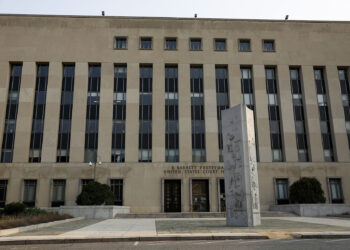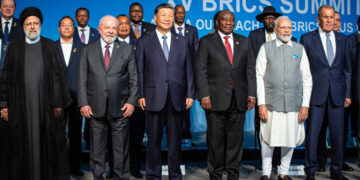Zaha Hassan is a human rights lawyer and a fellow at the Carnegie Endowment for International Peace. Her research focus is on Palestine-Israel peace, the use of international legal mechanisms by political movements, and U.S. foreign policy in the region. Previously, she was the coordinator and senior legal advisor to the Palestinian negotiating team during Palestine’s bid for U.N. membership, and was a member of the Palestinian delegation to Quartet-sponsored exploratory talks between 2011 and 2012.
Editor's note: This article is adapted from a paper presented at a workshop on aid conditionality that DAWN cohosted with the MIT Center for International Studies.
The United States has rarely if ever been singularly guided by human rights concerns in the pursuit of its objectives abroad. Certainly, as a baseline, American foreign engagement should be guided by the principle of "First, do no harm," which essentially means more deliberately incorporating human rights protections into its foreign policy. However, for that principle to gain some currency in policymaking circles in Washington, it must be understood as reinforcing national security and American interests, rather than hindering them.
What is the interest-based argument for "do no harm," then, and how can the U.S. ensure that it is not complicit in gross violations of internationally recognized human rights? A different kind of engagement that enables a measure of congruity between America's human rights obligations, according to both U.S. and international law, and its foreign policy objectives would serve U.S. interests and is indeed possible. Here's how.
Consider norms a national interest. Upholding the rules-based international order is a U.S. interest in its own right. Yet there is not enough analytical work done to show the myriad ways in which this is true. Policymakers and analysts tend to elevate geopolitical concerns above adherence to legal obligations and rights, as if there were no connection between them. In understanding what U.S. national interests are in any given time or context, policymakers ought to acknowledge and operationalize the notion that maintaining normative frameworks is, in fact, a first order U.S. interest. This is because the effective execution of American foreign policy objectives will be undermined by the failure to preserve and protect international law, particularly human rights standards.
Respect for international norms and the alignment of U.S. foreign policy with those norms tend to reinforce international legitimacy for U.S. policy positions and strengthen American engagement across the board in other areas. For example, when the U.S. adopts effective measures to ensure police units abroad that received U.S. training are not misusing weapons in violation of human rights, the U.S. is also reaffirming values that police must adhere to at home. The consistency between our values with respect to the use of force in domestic policing and that abroad becomes mutually reinforcing and strengthens U.S. credibility as a normative actor.
Make policymaking more diverse and inclusive. The lack of diversity and inclusion in decision-making in Washington limits the scope of U.S. foreign policy, especially when it comes to human rights. The fact that the policymakers themselves do not reflect the depth and breadth of the American experience shapes what kind of engagement the U.S. prioritizes abroad and which countries it engages with. U.S. policy choices are bound to steer away from human rights concerns when those most affected by U.S. policy—particularly marginalized groups such as refugees, women and the disenfranchised—are not part of the consultative process.
As part of addressing racial inequality, the Biden administration has appointed the first-ever chief diversity and inclusion officer at the State Department. Human rights advocates and country experts should support the work of this new office and offer ideas about how the State Department's operations, and U.S. values in general, might better align with the implementation of American policy abroad. During consultations with the diversity and inclusion officer, advocates and experts could highlight the issues of concern in a particular country and assist in identifying disempowered groups that are at high risk of being negatively impacted by U.S. policy choices. Feedback from these consultations could then be included in human rights impact assessments—the next key step.
Make human rights impact assessments mandatory. Before defining a plan of action or policy direction, decision-makers in Washington should be required to do an impact assessment that determines whether federal laws such as the Foreign Assistance Act and the Arms Export Control Act will be in conflict with a particular proposal. The assessment of whether human rights can be respected and whether security assistance is consistent with legitimate self-defense needs will be specific to each context. Decision-makers should examine the historical use of weapon systems by a foreign country, as well as determine the likely deployment of weapons systems transferred to that country, given the current political realities on the ground.

Restrict weapons use and require more reporting. U.S. security assistance to all foreign governments should include clear instructions regarding Washington's expectations related to grants or sales. For example, the U.S. should specifically prohibit particular weapons systems or munitions from use in occupied territories, and impose clear rules of engagement on the use of policing equipment. If an emergency use will deviate from a U.S. restriction, the foreign government should be required to notify the appropriate congressional committees and the Department of Defense. The foreign government should also submit a detailed report justifying the use and ensuring that human rights standards were adhered to.
End long-term aid commitments. The U.S. should end the practice of any long-term commitments for foreign security assistance, which create new problems and compound the issues of aid relationships. For example, the recurring 10-year memoranda between the U.S. and Israel for billions in annual military assistance creates political expectations in Israel and domestic dependences in the U.S., where weapons manufacturers are located, that will make it more difficult politically to suspend or terminate that assistance when necessary.
Establish mechanisms for accountability, traceability and end-use monitoring. No country should receive grants from the U.S. government in lump sum transfers to bank accounts under their sole control. Funds should stay in a U.S.-controlled account and should only be drawn down after Washington has received reports certifying that past use of materiel has been consistent with restrictions placed on it. The onus should be on the recipient country to provide an accounting of the deployment of specific weapons systems, so that traceability is possible. When policing equipment is involved in an incident in which human rights are allegedly violated, particularly in the Middle East—where the vast majority of U.S. weapons transfers are made and where credible reports of gross violations of human rights are common—the presumption should be that the equipment came via a U.S. transfer. The recipient country should offer any evidence otherwise. Creating reporting and evidentiary burdens makes the threat of a U.S. suspension of security assistance credible and ensures that the recipient country is keeping human rights in the forefront of its own protocols.
In addition, loopholes around the use of stockpiled American weapons abroad should be closed so that notifications and reporting are required, which would prevent the U.S. from appearing to be supporting escalations of violence and human rights abuses. These stockpiles are designed for quick access in an emergency. But the War Reserves Stock Allies-Israel, for one, which was set up in the 1990s, does not require pre-notification to the U.S. before being drawn down. During the 2014 Israeli bombardment of Gaza, the Obama White House was caught unaware of Israel's use of these stockpiled weapons, including tank and illumination rounds.
Stockpiled U.S. weapons in the Middle East, or any other region, should only be released for use by a foreign government after notification to the White House, and only for defensive purposes. Existing loopholes around these weapons depots prevent accountability during active conflicts and undermine the ability of the U.S. to ensure that it will be sufficiently equipped when it requires drawing down from the same stockpile.
End offshore procurement as a matter of law. Offshore procurement should be discontinued outright, with no exceptions for any country, since it runs counter to U.S. interests in preventing an arms race in conflict-ridden regions such as the Middle East. Offshore procurement also allows a recipient country to build up its own arms manufacturing capacities. In the case of Israel, offshore procurement has enabled it to become a leading weapons manufacturer and exporter with approximately $9 billion per year in weapons sales. These weapons, ultimately paid for by the U.S., are transferred to third countries over which the U.S. has no leverage and which may have problematic human rights records or become direct American adversaries.
Establish rules around the provision of security assistance. Overall, the U.S. desperately needs new rules for how and when it provides security assistance to a foreign government. For example, grants of security assistance should be phased out for countries capable of paying for weapons, such as Israel, which receives $3.3 billion per year in U.S. grants and has received 52 percent of all U.S. foreign military financing since 2001, even though its GDP rivals that of the United Kingdom, France and Japan. Besides avoiding U.S. complicity in human rights violations, making a foreign government bear the costs of its own weapons systems would discourage overspending on weapons and limit the potential for an arms buildup.
By incorporating the protection of human rights into its foreign policy, the U.S. would ensure that it is not creating more problems than it is trying to solve. Part of the reason why there has been so little prioritization of human rights in America's foreign engagements is because there is far too little appreciation of how U.S. support for normative frameworks strengthen the implementation of U.S. interests abroad. Washington can fix that by being more deliberate about which countries it transfers weapons to, when it does, and how its weapons may be used.
Other commonsense steps to ensure that the U.S. is not unwittingly facilitating gross violations of human rights are not difficult or costly, since the onus for better accountability should primarily be placed on the recipient country. The cost savings are not only about dollars and cents; they are about ensuring American national security interests are truly served and more effectively executed.
![]()





































